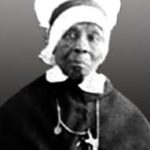
Educator, Foundress, Pioneer, Social Justice Warrior, Courageous Reformer
Servant of God, Mother Mary Lange, O.S.P.
Elizabeth Clarrise Lange, later known as Mother Mary Lange of the Oblate Sisters of Providence, was born circa 1794 in the French part of Santiago de Cuba. Elizabeth was born to a family of wealth and high social status, providing her the opportunity and privilege to receive an excellent education. As a young woman, Elizabeth left Cuba for the United States seeking freedom and security. She began her time in America in North Carolina, traveled up the east coast, and by 1813 had settled in Baltimore, Maryland.
At that time, Baltimore was home to a great number of French-speaking Catholic refugees who had fled Haiti during the Revolution. Upon arriving in Baltimore Elizabeth recognized a great need among the children of the African American community. Although there were some opportunities for education, there were no free public schools for children of color, making it nearly impossible for African American children to receive an education. Elizabeth became determined to fill this void. She so desperately wanted to provide a free education for these children that, with the help of her friend Marie Magdelaine Balas, Elizabeth opened her home as a free school for children of color.
Elizabeth served the African American community in this way for a number of years, but in early 1828 Rev. James Hector Joubert, S.S., at the bidding of Archbishop James Whitfield, presented Elizabeth with a new challenge. The Archbishop wanted Elizabeth to open an official school for girls of color and after much prayer, Elizabeth agreed.
Elizabeth developed a beautiful relationship with Father Joubert and eventually confessed to him her great desire to enter religious life. However, at that time, there were no religious communities that accepted men and women of color. Moved by the Holy Spirit and with the help and guidance of Father Joubert, Elizabeth requested permission from the Archbishop to found a religious community for women of color. By the grace of God, on July 2, 1829, Elizabeth and three other women took vows of poverty, chastity, and obedience becoming the first four sisters of the Oblate Sisters of Providence. Elizabeth was henceforth known as Sister Mary and served as the superior general of the Oblate Sisters from 1829 to 1832 and then again from 1835 to 1841.
Mother Mary spent the rest of her life serving her fellow religious sisters and the African American community in Baltimore, until her death on February 3, 1882. During her life, Mother Mary was faced with constant opposition and injustice but never abandoned her faith or mission. From the moment she entered religious life until the moment of her death, Mother Mary never stopped giving of herself to those around her. She loved her brothers and sisters with the love of Christ, never abandoning them and never giving up on them. She persevered through abandonment, persecution, and injustice in order to bring Christ to every individual she encountered.
In 1991, William Cardinal Keeler, then Archbishop of Baltimore, petitioned Rome to begin a formal investigation of Mother Mary’s life and works of charity as a potential cause for her canonization. Although not yet canonized, Mother Mary has been recognized by the Catholic Church as a Servant of God. To learn more about her cause for canonization, please visit motherlange.org.
“What were the works of Mother Mary Lange? We know of her private school in the early 1800s, of her academy in 1828 and of her religious foundation in 1829. But, there was also an orphanage, a widow’s home, spiritual direction, religious education classes and vocational training. The early Sisters did home visiting and conducted night schools so black adults could learn to read and write. When the Civil War was over, Baltimore was flooded with black war orphans. Mother Mary gathered 60 of them and began a new era of caring for destitute children. She was a religious pioneer.” Sister Reginald Gerdes, OSP

